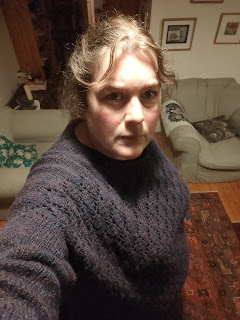I've been off work using up the last of my holiday allowance, my plans had included lots of blogging and other writing, but after a couple of flu-type bugs over the last couple of months, I've mostly spent the time recuperating. It's been very welcome, I still think I might just have had covid again despite tests being negative it's so exactly like I felt last time. It's the fatigue that gets me!
I didn't manage to catch up on reading in the way I'd hoped either, but I have caught up with people I really needed to see and it's coincided with one of the first big publishing weeks of the year - from my point of view at least - let's forget about Harry, and Spare, for now.
I've been looking forward to 'Dark Rye and Honey Cake' (Festival baking from the heart of the low countries) for a while. I think it was originally slated for publication last year and got pushed back. It's more than worth the wait. I've been a fan of Regula Ysewijn's writing since 'Pride and Pudding', and her photography since I first came across it in 'The Taste of Belgium' (published by Grub Street).
To be honest it's hard to think of a book that would appeal to me more even if I wasn't already a fan the enthusiastic quotes from Diana Henry, Felicity Cloake, Dr Annie Gray, and Caroline Eden (4 of my favourite food/food history writers right there) would have pulled me in. As it is there are the beautiful photographs that are a hallmark of Regula's books, along with the equally stunning illustrations by her husband, Bruno Vergauwen. It's a combination that really adds to the character of the books.
There's impeccable research that brings the history of the bakes here to life along with a sense of the cultures it comes from and does it in an extremely engaging way - this isn't a series of lectures, it's stories being passed between generations and cooks. And then there are the recipes. I've spent all weekend alternately reading and researching waffle irons.
Honestly, the only waffles I've had have been the supermarket sort which I don't think are going to be much of an indicator as to how these waffles will taste. Despite this, after reading through the several recipes here I'm quite willing to spend hundreds of pounds to buy a good electric waffle maker and a range of plates to go with it for making the different kinds of waffles. There's some handy advice on a couple of options to go for at the back of the book, perhaps fortunately neither is quickly available in the UK.
As an aside I had no idea that it was a thing to buy a traveling waffle iron suitable for camping, and I'm a little confused by the insistence for a lot of the non-electric ones that they need to be held over a fire or a gas ring. My electric hob seems a no. The sensible thing is probably to curb myself a bit, get one of the basic and fairly inexpensive electric models, find out how much I like homemade waffles, and then invest in more serious kit. It's not an approach commensurate with my enthusiasm.
Never mind, there are pancakes to make, fritters to fry, bread to bake, tarts to consider, and spice biscuits. The biscuit recipes are luring me online again because I'm frankly envious of Ysewijn's collection of wooden molds. I've wanted to find some antique biscuit molds for a very long time, but haven't ever managed to find any out and about in the UK. It's a much longer time since they've been part of our tradition so this isn't really surprising (sorry, that's another 15 minutes lost to etsy browsing).
It's an amazing book, the result of years of work and clearly a labour of love. It's got so much going for it that it wouldn't matter if you never baked a thing in it. Buy it for the pictures, or for the history, or the anecdotes, or all the personal touches and details that make it such a very charming book, or for the recipes - you wouldn't be disappointed on any of those fronts, I'm beyond happy with the whole package.






